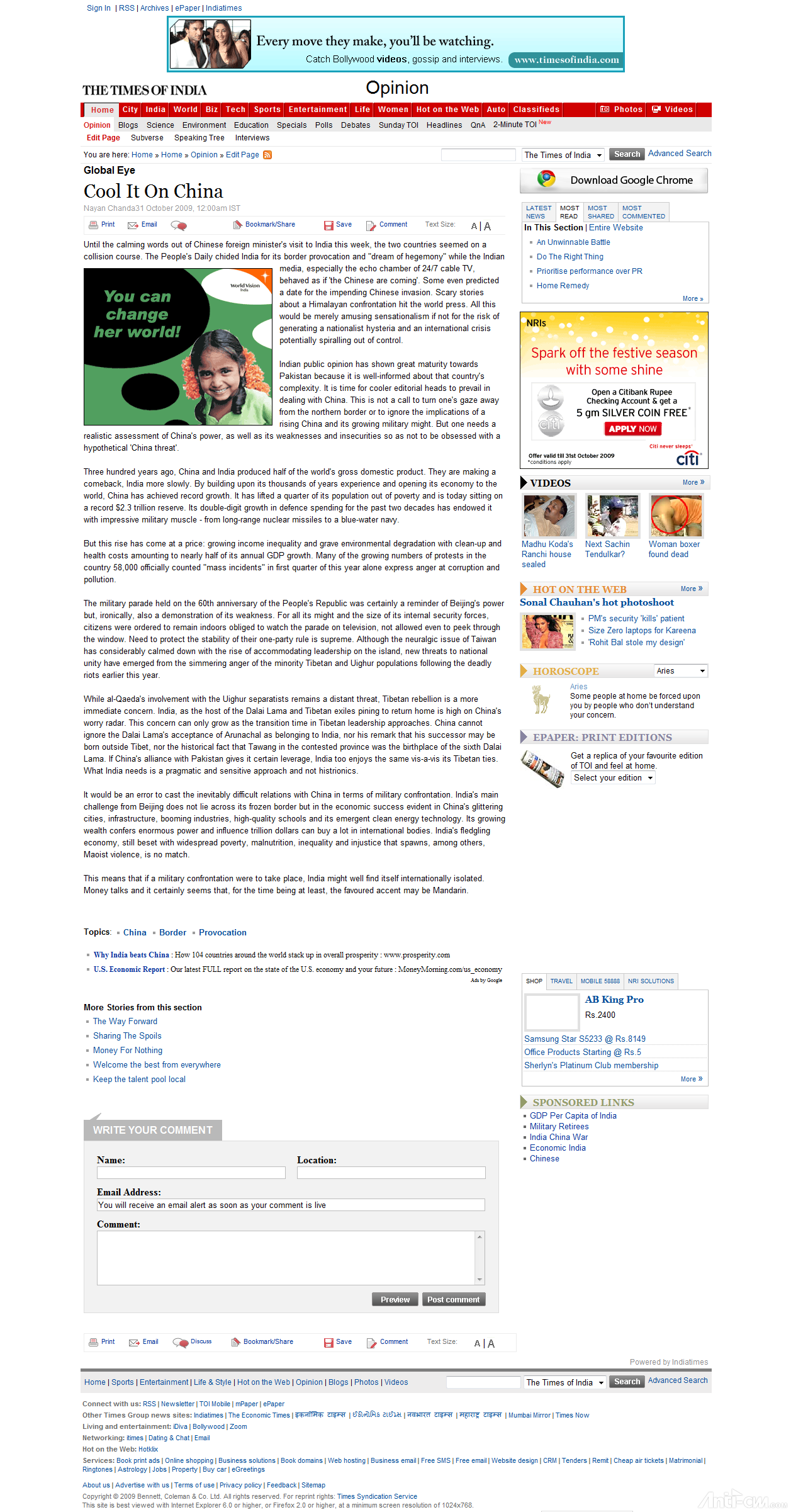本帖最后由 vivicat 于 2009-11-5 12:49 编辑
Globel Eye Cool It On China
Nayan Chanda31 October 2009, 12:00am IST
Until the calming words out of Chinese foreign minister's visit to India this week, the two countries seemed on a collision course. The People's Daily chided India for its border provocation and "dream of hegemony" while the Indian media, especially the echo chamber of 24/7 cable TV, behaved as if 'the Chinese are coming'. Some even predicted a date for the impending Chinese invasion. Scary stories about a Himalayan confrontation hit the world press. All this would be merely amusing sensationalism if not for the risk of generating a nationalist hysteria and an international crisis potentially spiralling out of control.
Indian public opinion has shown great maturity towards Pakistan because it is well-informed about that country's complexity. It is time for cooler editorial heads to prevail in dealing with China. This is not a call to turn one's gaze away from the northern border or to ignore the implications of a rising China and its growing military might. But one needs a realistic assessment of China's power, as well as its weaknesses and insecurities so as not to be obsessed with a hypothetical 'China threat'.
Three hundred years ago, China and India produced half of the world's gross domestic product. They are making a comeback, India more slowly. By building upon its thousands of years experience and opening its economy to the world, China has achieved record growth. It has lifted a quarter of its population out of poverty and is today sitting on a record $2.3 trillion reserve. Its double-digit growth in defence spending for the past two decades has endowed it with impressive military muscle - from long-range nuclear missiles to a blue-water navy.
But this rise has come at a price: growing income inequality and grave environmental degradation with clean-up and health costs amounting to nearly half of its annual GDP growth. Many of the growing numbers of protests in the country 58,000 officially counted "mass incidents" in first quarter of this year alone express anger at corruption and pollution.
The military parade held on the 60th anniversary of the People's Republic was certainly a reminder of Beijing's power but, ironically, also a demonstration of its weakness. For all its might and the size of its internal security forces, citizens were ordered to remain indoors obliged to watch the parade on television, not allowed even to peek through the window. Need to protect the stability of their one-party rule is supreme. Although the neuralgic issue of Taiwan has considerably calmed down with the rise of accommodating leadership on the island, new threats to national unity have emerged from the simmering anger of the minority Tibetan and Uighur populations following the deadly riots earlier this year.
While al-Qaeda's involvement with the Uighur separatists remains a distant threat, Tibetan rebellion is a more immediate concern. India, as the host of the Dalai Lama and Tibetan exiles pining to return home is high on China's worry radar. This concern can only grow as the transition time in Tibetan leadership approaches. China cannot ignore the Dalai Lama's acceptance of Arunachal as belonging to India, nor his remark that his successor may be born outside Tibet, nor the historical fact that Tawang in the contested province was the birthplace of the sixth Dalai Lama. If China's alliance with Pakistan gives it certain leverage, India too enjoys the same vis-a-vis its Tibetan ties. What India needs is a pragmatic and sensitive approach and not histrionics.
It would be an error to cast the inevitably difficult relations with China in terms of military confrontation. India's main challenge from Beijing does not lie across its frozen border but in the economic success evident in China's glittering cities, infrastructure, booming industries, high-quality schools and its emergent clean energy technology. Its growing wealth confers enormous power and influence trillion dollars can buy a lot in international bodies. India's fledgling economy, still beset with widespread poverty, malnutrition, inequality and injustice that spawns, among others, Maoist violence, is no match.
This means that if a military confrontation were to take place, India might well find itself internationally isolated. Money talks and it certainly seems that, for the time being at least, the favoured accent may be Mandarin.

|